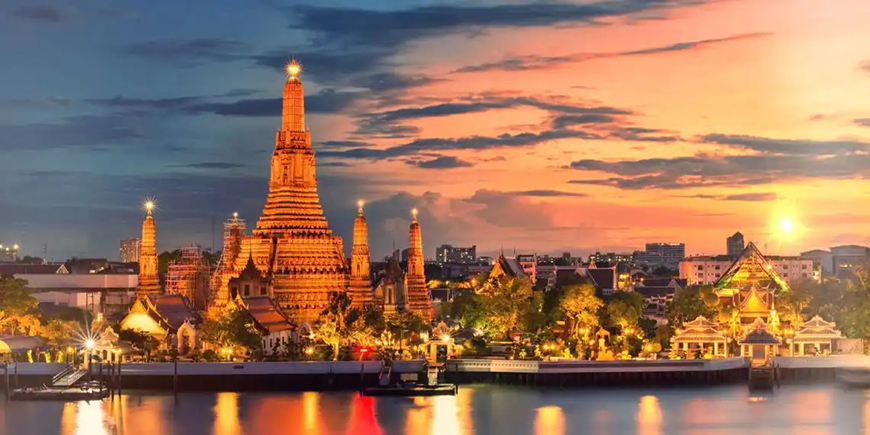Thailand, a popular destination for business tourism
With its modern infrastructure, legendary hospitality and strategic location in Southeast Asia, Thailand has become one of the world's leading destinations for business tourism in recent years. Here's a look back at the boom in this sector in the kingdom and the outlook for the future.
This article offers a comprehensive overview of business tourism in Thailand, exploring its history, current state and future prospects.
The rise of business tourism in Thailand: A retrospective
The history of business tourism in Thailand is relatively recent, but its growth has been meteoric over the last few decades.
Thailand's business tourism industry began to take shape in the 1960s, with the establishment of Bangkok's first international airport.
Initially, the capital was the main hub, with its luxury hotels and exhibition center. However, other cities such as Phuket, Pattaya and Chiang Mai quickly developed to welcome business travellers. The country's strategic location, infrastructure and business-friendly environment have made it an attractive destination for international companies and organizations.
Did you know? According to a study by the Pacific Asia Travel Association (PATA) , business traveler arrivals in Thailand have risen from 500,000 in 2000 to over 1.3 million in 2019, generating estimated revenues of 53 billion baht ($1.5 billion).
1980s: The first steps
The 1980s saw the emergence of business tourism in Thailand. The construction of modern infrastructures, such as Bangkok-Suvarnabhumi International Airport, helped to facilitate access to the country and stimulate the arrival of business travellers.
1990s: Dazzling growth
The 1990s saw a meteoric rise in business tourism in Thailand. The country's strategic geographical position at the heart of Southeast Asia and its political stability made Thailand a preferred destination for international events.
2000s: Consolidation and diversification
The 2000s saw the consolidation of business tourism in Thailand. The country diversified its offer by opening up to new market segments, such as incentives and professional events.
Key factors in the development of business tourism in Thailand
- ✓ Political and economic stability: Thailand enjoys considerable political and economic stability, reassuring investors and event organizers alike.
- ✓ Accessibility: The country is easily accessible by air, with direct flights from many of the world's major cities.
- ✓ Hotel infrastructure: Thailand has a wide range of quality hotels, from budget establishments to luxury resorts, catering to the diverse needs of business travelers.
- ✓ Value for money: Thailand offers excellent value for money in terms of accommodation, catering and other services.
- ✓ Diversity of destinations: Beyond Bangkok, Thailand offers attractive alternative destinations for business events, such as Phuket, Chiang Mai and Pattaya.
State of MICE tourism in Thailand: A diversified offer for all requirements

A luxury Resort in Phuket - Source : Amanpuri Resort
Assets of MICE tourism in Thailand
- ✓ Convention and exhibition centers: The huge Bangkok International Trade & Exhibition Centre (BITEC) can accommodate up to 40,000 visitors. Other cities such as Phuket and Chiang Mai also boast state-of-the-art centers.
- ✓ Business hotels: Many renowned international hotel chains (Marriott, Hilton, Accor...) offer dedicated establishments for business travelers, with meeting rooms, business centers and top-of-the-range services.
- ✓ Efficient transport: Bangkok's two international airports (Suvarnabhumi and Don Mueang) link Thailand to the rest of the world. A high-speed rail network is also under development.
- ✓ Team-building activities: Golf, water sports, Thai cooking classes... numerous activities are available to strengthen team cohesion during corporate seminars.
According to the Thailand Convention & Exhibition Bureau (TCEB) 2022 report, 130 international events were scheduled in the country that year.
Key figures for MICE tourism in Thailand
- ♦ In 2019, Thailand welcomed over 39 million tourists, including around 1.5 million business travelers.
- ♦ Revenues generated by MICE tourism in Thailand amount to several billion dollars each year.
- ♦ The Thai government is implementing proactive policies to support the development of MICE tourism, notably by investing in the construction of new infrastructure and making it easier for business travellers to obtain visas.
- ♦ In 2020, Thailand welcomed more than 1.3 million business travellers, generating revenues of over THB 100 billion (approx. USD 3.3 billion) (Source: TCEB).
- ♦ Thailand's business tourism industry is expected to grow at a rate of 10% per year between 2020 and 2025 (Source: Grand View Research).
- ♦ Thailand is home to over 1,000 international companies, including Fortune 500 companies such as Honda, Toyota and Sony (Source: Board of Investment of Thailand).

Wat Arun, emblematic temple of Krung Thep Maha Nakhon (The real name of Bangkok) - Source : Internet
Examples of emblematic venues for MICE events in Thailand
- ✓ Bangkok : Impact Arena, Queen Sirikit National Convention Center, Centara Grand at CentralWorld
- ✓ Phuket : Phuket Convention Center, Laguna Phuket, Angsana Laguna Phuket
- ✓ Chiang Mai : Chiang Mai International Convention and Exhibition Center, Dusit Thani Chiang Mai, Le Meridien Chiang Mai
The future of business tourism in Thailand: Promising prospects despite challenges
Despite the stoppage of Covid-19, Thai business tourism should continue to grow in the coming years, driven by several factors:
Thailand's central position in Asia, just a few hours' flight from many regional capitals
Massive investment in transport infrastructure (new airlines, Bangkok-Chiang Mai high-speed train, etc.).
The renowned professionalism and hospitality of the Thai people
A booming MICE (Meetings, Incentives, Conferences & Exhibitions) offer.
However, the kingdom also faces a number of challenges, such as a shortage of skilled workers in the sector, particularly in foreign languages, and increased competition from neighboring countries (Singapore, Malaysia, Vietnam).
Conclusion
Thailand has established itself as a leading destination for business tourism, offering a unique blend of culture, infrastructure and a business-friendly environment. Although challenges remain, the sector is poised for growth, driven by digitization, niche markets and regional development. With continued support and investment from the Thai government, Thailand is set to remain a destination of choice for business tourism in Asia.